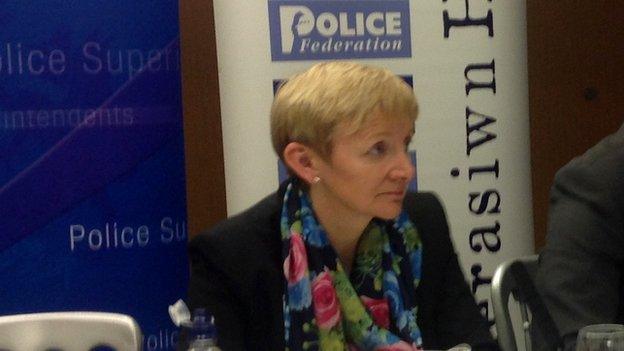Stop publishing crime stats, says police union chief
- Published

Irene Curtis was taking part in a fringe meeting at the Lib Dem conference
Police forces should stop publishing crime statistics because they give the public the wrong impression, a police union leader has said.
Police Superintendents' Association president Irene Curtis told a meeting at the Lib Dem conference police did "much more" than record crime.
A more "sophisticated" measure of performance was needed, she added.
Sir Hugh Orde, chairman of the Association of Chief Police Officers, also urged a debate on statistics.
Home secretaries have long used quarterly crime figures to justify their crime-fighting policies.
These are also used to allocate police resources at a local level and give residents a picture of criminality in their area, through online crime maps.
Human error
But there is growing evidence that they are not providing a true picture.
The UK Statistics Authority, the watchdog that oversees the publication of official data, said in January it could no longer approve crime figures based on information recorded by the police in England and Wales.
It found evidence that forces had been undercounting crime - due to human error, poor training and dealing with incidents informally - or, in some cases, massaging the figures to meet performance targets.
There has also been criticism that some crimes - such as four million examples of credit card fraud every year - are not included in the official figures.
At a fringe meeting at the Lib Dem conference in Glasgow. Mrs Curtis, a former deputy chief constable, said the answer was to stop publishing them altogether.
'Bared bottoms'
"I actually think recorded crime should not be a measure of police performance," she said. "Police do far more than record a crime. The difficulty is when you start looking at recorded crime versus police performance... you can't correlate the two."
She said crimes should still be recorded by officers but the statistics should not be made public.
"If you take away that measurement and find a much more sophisticated way of measuring police performance but leave the actual recorded crime to the police - to look at internally so they know what's happening - they can deploy resources, they can use it for intelligence. I think we'll be in a much stronger position around crime stats."
Sir Hugh Orde, former chief constable of the Police Service of Northern Ireland, said: "We need to have a whole new debate about what's recorded and what isn't."
To highlight what he suggested was the absurdity of the current system he cited the example of a chief constable whose officers were accused of "hiding crime" because they had chosen to deal with an incident informally rather than record it as a crime.
"Three kids under the age of criminal responsibility had dared to bare their bottoms at passing motorists," Sir Hugh said. "The officer had two options. What he did is what I think you'd expect him to do. He got hold of the kids took them home, spoke to their mum and dad."
Crime has been falling in the UK since the mid-1990s - but incidents recorded by the police are going down at a faster rate than those uncovered by the British Crime Survey, the other official measure, which relies on face-to-face interviews with the public.